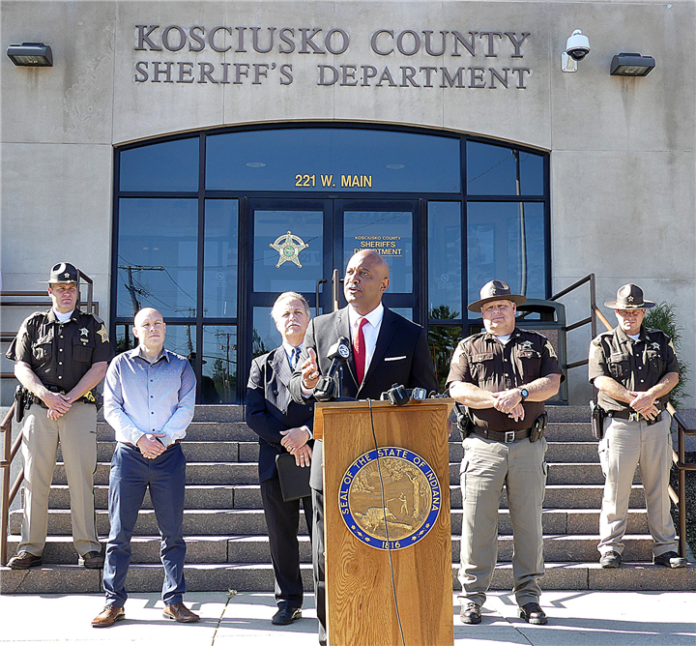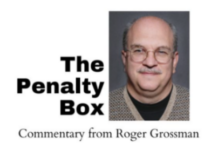Indiana Attorney General Curtis Hill stopped at the Kosciusko County Sheriff’s Department this morning to announce the county will receive an $87,800 grant from the Indiana Drug Enforcement Association.
The money will be used to establish a Jail Chemical Addiction Program (JCAP) through a contract with the Bowen Center.
RELATED: Kosciusko County Sheriff’s Department aims to add Jail Chemical Addictions Program
The award is made possible through seed funding from the Office of the Attorney General, according to a news release provided at the press conference today.
Hill was joined at the press conference by Kosciusko County Sheriff Rocky Goshert, County Prosecutor Dan Hampton and Bowen Center Director Matthew Graham.
In his remarks, Hill said, “The best correctional models are those that not only penalize offenders for their crimes, but also help to improve their character by addressing social, emotional, spiritual, educational and family issues through targeted services.”
He said JCAP is one model “that puts this truth in practice,” and that the JCAP programs in Boone and Dearborn counties show it works.
“We want to spread this model across the state. To this end, we are pleased to help facilitate a grant of $87,800 for the purpose of starting a JCAP here in Kosciusko County,” Hill said.
Jails house a large number of addicts. He said, “By some estimates, the proportion of the incarcerated population with substance abuse issues hovers around 80 percent. Targeting inmate populations therefore represents one of the best methods of reaching drug users in need of services the most.”
He emphasized that, without going soft on crime, “We must insist offenders be provided genuine and meaningful opportunities to turn their lives around and break the cycles that lead individuals repeatedly into criminal behavior.”
For criminal offenders with addiction problems, incarceration “can be a godsend if it helps put them on a road to recovery. That’s what JCAP is all about,” Hill said.
He said the key is connecting inmates with quality, long-term treatment programs that begin during incarceration and continue upon their release.
“In effective JCAP programs, participants are separated from others in the jail population and are expected to spend at least 90 days in cognitive, behavioral therapy,” he said. Master-level social workers conduct group and individual counseling. “The key to long-term success is to create solid plans for continued treatment once the participants complete their jail sentence,” he said.
Hill said his office is holding meetings across the state to promote the program and encourage other counties to make chemical addiction programs available in their jails.
He said today was the first time funds were provided for a JCAP start-up.
Goshert thanked Hill for allowing Kosciusko County to start a JCAP here.
“There’s a great need. As our jail population was growing, we were looking … at what we were going to do. We figured out that law enforcement could no longer arrest its way out of this problem because we were having so many repeat offenders with alcohol and drug abuse. So we decided we needed to look at what programs were out there,” Goshert said.
When JCAP was brought to his department’s attention, he said they looked at Dearborn County’s program and talked to the people down there about it. It was discussed further, including with the state attorney general’s office which explained the program.
“With the rising number of people we had and the repeat offenders we kept rearresting, we decided this was the program for us, this was the program we needed to install and see where we could go with this,” Goshert said.
He said law enforcement knows how to incarcerate people, but it needed to look at how to rehabilitate them so they could be productive members of society.
“We think that we have the opportunity to start this in the next few weeks here in the jail and we’re looking forward to that,” Goshert said.
Hampton thanked Boone and Dearborn counties for sharing their experience, and the attorney general’s office for its financial encouragement and “for introducing us to a new way to address the devastation of drug and alcohol abuse and on the lives of individuals, children and families in our community.”
He said the county knows it’s got to think outside of the box and it can’t “arrest our way out of this problem.”
“The very concept of JCAP is a complete paradigm shift from punitive to the therapeutic. Justice and treatment can live together,” Hampton said.
He said court staff repeatedly see many of the same defendants time and again. “If we could truly change the patterns of misbehavior that exists among the relatively small segment of the population, we would make the whole community safer. This is exactly the aim of JCAP: To alter the habits, specifically of those known to struggle with substance abuse.”
The program focuses on moderate, high-risk offenders who are chemically dependant. No serious violent offenders, no major drug dealers and/or sex offenders will be admitted into the program, Hampton said. JCAP is an entirely volunteer program, with 90 days minimum and no promise of leniency by the courts at sentencing even if the program is completed successfully. “The applicant’s primary goal should be recovery,” Hampton said.
JCAP is funded through grants, with “little to no use of county tax dollars,” Hampton said.
Graham said the Bowen Center was “excited to be a part of this process. Often times we don’t get a chance to work with individuals until they are released from jail, and in those situations sometimes individuals don’t make it to our doorway. As a result of being able to be a part of this from day one, as they are in jail we can continue that service even as they exit and they actually have a headstart on that process. We are very excited about this.”
During a question-and-answer session, Hill said Kosciusko County stepped up to take part in JCAP, but it’s an option any county has.
He said it could “absolutely” save taxpayer dollars down the road. “Keep in mind, this is all about keeping people from reoffending and going back into incarceration. Right now, we have a revolving door. … So that’s all money being eaten up by the same people. It’s a known fact that a very small percentage of people commit the vast majority of your crime. So if we effectively deal with those frequent fliers, those people who do the same things over and over and over again, we’re going to have a financial impact, we’re going to have an emotional impact, we’re going to have a community impact that will improve the lives of everyone.”





